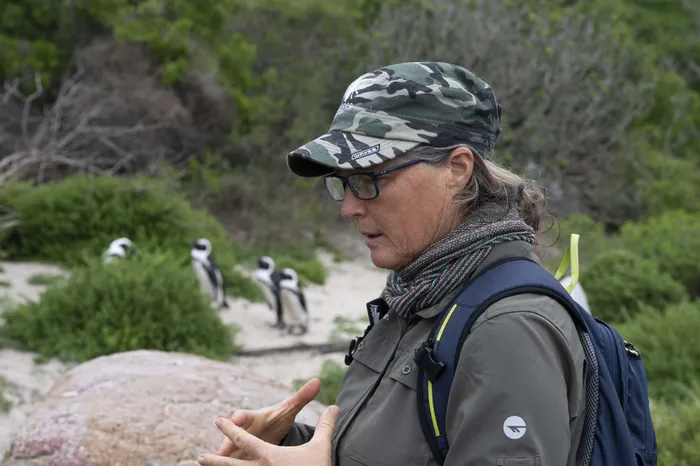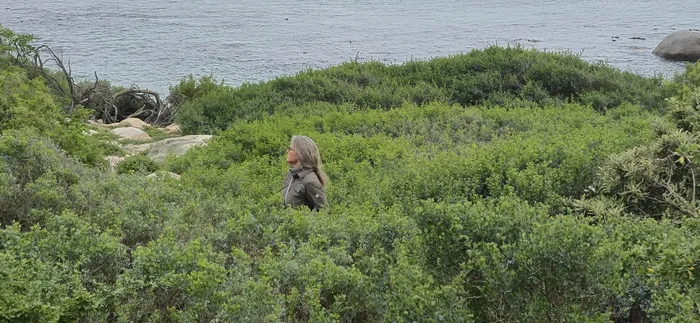A honey trap leading to a war between the birds and the bees with penguins the losers

Jenny Cullinan has raised concerns about how humans keeping wild bees affects the penguin colony
Image: Armand Hough
African Jackass Penguins, already driven to near-extinction by overfishing, predators like sharks, seals and killer whales among others, are facing a new enemy - honey bees.
Ten African penguins, part of one of the last surviving colonies of this critically endangered species, have died at Boulders Beach, Simon’s Town, after being stung by honeybees.
The deaths are not the fault of the bees. Nor are the penguins to blame. Instead, conservationists point to the human hand: an unnaturally high concentration of managed honeybees in the area, fuelled by unregulated beekeeping, bee poaching, and urban hobby hives.
Jenny Cullinan, the world’s first wild honeybee researcher, said the deaths were “a direct consequence of human interference”. She explained: “It is not right for the penguins to be in these fake nests, as these artificial penguin nests replicate bee hives which attract swarming managed bees to them. We have an unnaturally high population of honeybees, because of beekeeping in Simon’s Town.”
Penguin deaths began quietly, with city coastal staff discovering lifeless birds along the shoreline. “I was shown one dead penguin with its eyes inflamed,” Cullinan recalled. “It had been stung by bees. That was number eight.”
And then, in a cruel twist of timing, while Cullinan was speaking to the Weekend Argus about the crisis, she was called out to another sighting of a bee nest and was told that two more penguins had died, raising the death toll to 10.

Jenny Cullinan searching for bees nests amongst the bushes at Boulders where another two penguins were found dead
Image: Tracy-Lynn Ruiters
Cullinan said bees, when disturbed, sting around the eyes, ears, and beaks, the most sensitive areas of mammals and birds.
"While it takes only one or two stings to trigger a fatal histamine reaction in penguins, a defensive swarm can kill a cluster of birds in minutes.”
Cullinan warns the crisis is being compounded by a growing underground trade.
"Bee poaching has increased from protected areas like Table Mountain National Park where the bees are taken from the wild, and sold on or kept in peoples gardens.
“Not only are we dealing with the unnaturally high population of bees because of beekeeping, but we also have to deal with the poaching of bees from protected areas. Bees are being industrialised so that people can profit, whether through honey production or pollination services,” she said.
She argues that the penguin colony and wild bees could coexist, if not for human interference and has repeatedly appealed for simple measures, like the removal of the artificial penguin nests from Boulders and for the beekeeping bylaws to be enforced.

The honey bees nests inside the makeshift penguin nests
Image: Armand Hough
But the issue, she said, is systemic. “Urban beekeeping is trendy. People think they are 'saving' the bees, but it’s the worst thing to do. Honeybees in boxes lose their natural wisdom. It disrupts biodiversity and, here in Simon’s Town, it is threatening penguins with extinction.”
The tragedy of 10 penguins stung to death is not an isolated incident. Cullinan notes that this is the fifth such occurrence that she is aware of, recalling a previous mass fatality where more than 60 penguins died in a single attack.
“The city needs to join the dots,” she insists. “This is not going to go away. It’s going to get worse. The more people think it’s a good idea to keep bees in Simon’s Town, the more this critically endangered penguin colony will suffer.
“What may appear to be a clash between bees and penguins is, at its core, a human problem, one rooted in greed, fashion, and the failure to enforce protective bylaws. Without urgent intervention, I fear that Boulders Beach, one of Cape Town’s biggest wildlife tourism attractions may lose the very creatures it is famous for and to top it off the natural biodiversity will forever be disturbed.”
SANParks addressed Cullinan’s concerns with Charles Phahlane, SanParks Senior Communications Manager, explaining that while the deaths are tragic, bee attacks are a known risk for the critically endangered penguin colony.
“The 2021 incident, in which 67 penguins died, showed that birds had between two and 35 stings, averaging about four stings per kilogram of body weight. This demonstrates that African penguins are particularly vulnerable to bee venom,” he said.
Phahlane stressed that the origin of the bees cannot always be conclusively determined. “They may have come from managed hives or wild swarms. Bees naturally swarm in search of new nesting sites, and occasionally these swarms move into artificial penguin nests deployed to support breeding.”
He also emphasised that penguins face multiple other natural risks, including marine and terrestrial predators, as well as diseases such as avian influenza. “While these deaths are unfortunate, our focus is on maximising survival for the colony using all available management strategies,” Phahlane said.
He explained rangers actively monitor the colony, relocating bee swarms that attempt to establish hives near penguins, and buffer zones between apiaries and wildlife areas are under consideration.
“Healthy pollinator populations are vital for ecosystem resilience, but in the case of African penguins, every individual bird matters,” he added.
Phahlane also highlighted the regulatory framework for urban beekeeping: “All beekeepers must be registered with the Department of Agriculture, Land Reform and Rural Development, and comply with municipal by-laws around hive placement. These measures exist to ensure that managed hives do not pose a risk to wildlife or the public.”
He concluded: “SANParks is committed to maintaining a healthy ecological balance, protecting both pollinators and endangered species like the African penguin. While human interference can increase risks, our ongoing monitoring, relocation efforts, and management strategies aim to minimise threats and ensure the survival of the colony.”
He however did not comment on the recent deaths of the 10 penguins.
In response to concerns about urban beekeeping near the African penguin colony at Boulders Beach, the City of Cape Town said no complaints or applications regarding beekeeping in Simon’s Town have been received by Environmental Health. The National Norms and Standards for Environmental Health set requirements for distance from hives, which any beekeeper applying for permission would need to comply with. These include minimum distances from property boundaries, public places, human habitation, and areas used for keeping animals or poultry. Applications are assessed against these standards should they be submitted.
Wayne Dyason, spokesperson for Law Enforcement, added that officers have noticed no proliferation of beehives in Simon’s Town and that only one complaint has been dealt with in the past year.
The Animal Keeping By-Law 2021 governs urban beekeeping. Key provisions include:
No person may keep bees in residential areas or public spaces without City permission.
Beekeepers must register with a recognised association or the National Department of Agriculture and submit proof to the City within 30 days.
The City may establish a beekeeping database and inspect premises.
Beekeeping must not create a health or general nuisance. Property owners are responsible for hives on private property; City departments are responsible on municipal land.
Authorised officials, including Law Enforcement and Conservation officers, are tasked with enforcing these provisions.
Eddie Andrews, Deputy Mayor and Mayoral Committee Member for Spatial Planning and Environment, acknowledged the vulnerability of African penguins to bee stings. He noted that previous incidents likely involved swarms from disturbed wild nests and emphasised the difficulty of tracing bees to a specific hive due to the prevalence of wild colonies.
“Bees play a critical role in the ecosystem, and it is important that we find a solution that protects both bees and African penguins,” Andrews said. “We are working with SANParks to identify effective measures to safeguard both species.”
tracy-lynn.ruiters@inl.co.za
Weekend Argus